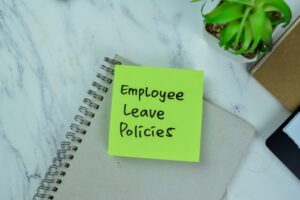How you should be approaching prolonged sick leave and bereavement leave in your business? How bereavement leave fits into the workplace and what does prolonged sick leave mean?
Since the emergence from the global pandemic, organisations are witnessing a significant shift in the way we perceive work and its relationship with personal wellbeing. The developments in hybrid working and fully remote working are no longer news, but businesses are still managing the trickle-down effects of this shift.
In a post-pandemic landscape, prolonged sick leave and bereavement leave has come to have new connotations that are worth exploring – particularly in the context of employees who wish to continue working from home to protect vulnerable loved ones or themselves.

How bereavement leave fits into the workplace
The loss of a loved one is an emotionally challenging experience that requires time and support for grieving employees. Bereavement leave is a crucial aspect of employee wellbeing, allowing individuals the necessary space to cope with their loss and attend to important matters. In a post-pandemic world, it becomes even more critical for businesses to recognise the impact of grief on their employees’ productivity and mental wellbeing, following two years of worldwide loss.
To effectively integrate bereavement leave into the workplace, HR professionals should establish clear bereavement leave policies, especially noting measures for remote or flexible workers. Employees shouldn’t feel tempted to log on from home and pick up any work whilst taking time for bereavement. Create comprehensive policies that outline the duration, eligibility criteria, and the level of support provided during this time.
However, it’s important to listen to your workers: offering compassionate and flexible leave options can allow businesses to demonstrate empathy and foster a supportive environment. Offering access to grief counselling services, employee assistance programs (EAPs), or support groups can also help employees navigate the grieving process and feel confident speaking up about their needs.
What does prolonged sick leave mean?
Prolonged sick leave is a reality that organisations must address, especially since the pandemic has heightened health and safety concerns worldwide. As HR experts, it is crucial to strike a balance between employee well-being and business productivity.
To effectively manage prolonged sick leave and flexible working arrangements, consider implementing adaptability in work arrangements. Evaluate the feasibility of remote work or hybrid models for employees requiring prolonged sick leave. Implement flexible scheduling, reduced workloads, or job sharing to accommodate their needs while ensuring business continuity.
By fostering an environment that values employee wellbeing and encourages open dialogue about health concerns, employees can become empowered to discuss their needs by collaborating on solutions that meet both personal and professional requirements. Wellness programs, mental health support, and access to healthcare resources can boost a culture of open discussion. Encourage regular check-ins to assess employees’ health and well-being, providing assistance or accommodations where necessary.
Looking for support?
In a post-pandemic landscape, it is essential for HR professionals to approach prolonged sick leave and bereavement leave with empathy, open communication, and adaptable policies. Implementing sufficient HR support can help your business effectively navigate these challenges while enabling employees to balance their care responsibilities with their professional commitments.
It is a difficult balancing act for an employer to manage the needs of the business whilst still supporting their employee. This is where support from HR is invaluable, in addition to utilising such various agencies and advisors out there such as access to work, occupational health and other support organisations depending on the situation.
Embracing these approaches ensures that businesses thrive while valuing the health and well-being of their most valuable asset—their employees. Get in touch today to gain your business crucial support in managing sick leave and bereavement leave.


